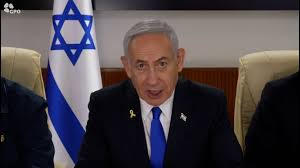Israel-Iran conflict: Netanyahu says Tehran ‘wants to kill’ Trump to eliminate threat to its nuclear program

Tensions in the Middle East surged once again after Israeli Prime Minister Benjamin Netanyahu made explosive claims during a televised interview, alleging that Iran has plotted to assassinate former U.S. President Donald Trump. According to Netanyahu, Tehran views Trump as a primary obstacle to its nuclear ambitions and is actively trying to eliminate him.
This dramatic statement comes amid heightened military hostilities between Israel and Iran, raising concerns that the decades-long shadow conflict may spiral into a broader regional war.
Netanyahu’s Claims: Trump Is “Enemy Number One” for Iran
Speaking to Fox News, Prime Minister Netanyahu did not mince words. He said Iranian leaders considered Trump their top adversary, specifically due to his hardline stance on Iran’s nuclear program.
“They want to kill him. He’s enemy number one,” Netanyahu declared.
“Trump derailed their nuclear path, sanctioned their economy into collapse, and took out Qassem Soleimani. Iran hasn’t forgotten any of that.”
Netanyahu referred to Trump’s 2018 decision to withdraw the United States from the Iran nuclear deal—officially known as the Joint Comprehensive Plan of Action (JCPOA)—as a key turning point. That move led to the reimposition of heavy sanctions on Tehran, crippling its economy and isolating it diplomatically. Tensions reached a boiling point in January 2020 when Trump authorized a drone strike that killed top Iranian commander Qassem Soleimani.
Allegations of Assassination Plots
Netanyahu further claimed that Iran had orchestrated two failed assassination attempts on Trump in recent months. Though he did not reveal operational details, the Israeli premier insisted that both attempts were thwarted thanks to intelligence-sharing between U.S. and Israeli agencies.
The U.S. government has not officially confirmed these allegations, and intelligence agencies have refrained from commenting. However, unnamed sources within Israeli security circles hinted that the plots were real and involved both direct and proxy actors under Iran’s command, possibly including Hezbollah and operatives in Latin America.
Tehran, for its part, has categorically denied the allegations. In a statement issued by the Iranian Foreign Ministry, officials called Netanyahu’s remarks “a fabrication designed to justify Israeli aggression and distract from domestic turmoil.”
Strategic Timing Amid Escalating Military Action
Netanyahu’s claims appear to be part of a larger campaign to justify Israel’s recent military strikes on Iranian territory. Over the past week, Israel has launched precision airstrikes on what it describes as Iran’s nuclear infrastructure and weapons production facilities under “Operation Rising Lion.”
The Israeli government argues that the strikes are preemptive in nature and aimed at delaying or dismantling Iran’s nuclear capabilities before it can develop a nuclear bomb. The international community remains divided, with some allies supporting Israel’s right to self-defense, while others caution against further escalation.
Netanyahu’s focus on Trump as a target is also politically significant. The former U.S. president remains a key ally of Israel and is currently campaigning for re-election in 2024. By highlighting threats against Trump, Netanyahu not only appeals to pro-Israel constituencies in the U.S. but also ties Iran’s nuclear ambitions to global security concerns.
U.S. Reactions: Silence and Strategy
The Biden administration has not issued a formal response to Netanyahu’s accusations. However, analysts believe the White House is treading carefully, balancing support for Israel with efforts to avoid triggering a full-scale war in the region.
Trump himself briefly addressed the matter during a campaign event in Florida, saying:
“I’ve faced threats before. Nothing new. Iran knows I won’t be intimidated.”
Despite his nonchalant tone, sources close to the Trump campaign confirmed increased security measures and intelligence coordination with U.S. agencies.
Interestingly, Trump also claimed he had blocked an Israeli operation to assassinate Iran’s Supreme Leader Ayatollah Ali Khamenei during his presidency, warning that such a move could have sparked World War III. These revelations add more intrigue to the already volatile geopolitical climate.
The Nuclear Question: Real Threat or Political Theater?
Iran maintains that its nuclear program is entirely peaceful and aimed at energy production and medical research. However, Israel and Western intelligence agencies argue that Tehran’s uranium enrichment activities exceed civilian requirements and may indicate weapons-grade ambitions.
The International Atomic Energy Agency (IAEA) has reported increasing difficulties in inspecting Iranian facilities, particularly following the collapse of the JCPOA. Israeli officials now claim Iran is only months away from acquiring sufficient enriched uranium for a nuclear weapon—a claim Iran fiercely denies.
If Netanyahu’s assertion about assassination plots is accurate, it suggests Iran sees Trump not just as a former political leader but as a significant obstacle to its long-term strategy. It also reflects the personal nature of Middle East geopolitics, where individual leaders can become focal points of enmity.
Outlook: A Region on Edge
As of now, both Iran and Israel appear to be preparing for sustained conflict. Iran has responded to Israeli strikes with missile launches, targeting military bases in northern Israel. While casualties have been minimal due to advanced missile defense systems, the psychological and political impact is profound.
International actors, including the European Union and the United Nations, have called for an immediate ceasefire and a return to diplomatic negotiations. But with accusations of assassination plots, military escalations, and political posturing on both sides, the path to peace seems increasingly narrow.
For Netanyahu, raising the specter of Iranian aggression against Trump may rally domestic and international support. For Iran, it provides another justification to frame Israel as an aggressor and mobilize regional proxies.
Final Thoughts
Whether or not the assassination plots against Trump are verified, Netanyahu’s claims underline the dangerous volatility of the Israel-Iran conflict. With two ideologically opposed regimes, regional power plays, and nuclear stakes in the mix, the world must watch closely. A misstep could ignite a conflict far greater than what we’ve seen in recent decades.






